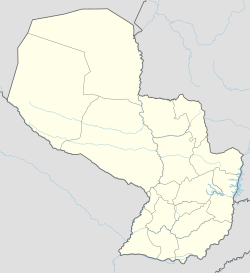Alto Verá
Alto Verá | |
|---|---|
Clockwise from top: a grassland in Alto Verá, a man standing under the Caronay Old Bridge, a view of the central park and the city hall building. | |
| Government | |
• Mayor | Hernán Ariel Ávalos Ortiz (ANR) |
| Area | |
• Total | 335 km2 (129 sq mi) |
| Elevation | 297 m (974 ft) |
| Population | |
• 2023 estimate | 18,909 [1] |
• Density | 52.73/km2 (136.6/sq mi) |
| Time zone | UTC-4 |
| Calling code | 71 |
| Website | https://www.altovera.gov.py |
Alto Verá is a district in Northern Itapúa, Paraguay. It is known for being the "biggest national power" of women's football and its dance schools. The main source of income for its inhabitants is soy and wheat.
History
[edit]On December 20, 1984, the district was created and named Doña Heriberta Stroessner de Iglesias, breaking off of the district of San Pedro del Paraná.[2] In 1989, the district was renamed to Alto Verá by law.[3]
Geography
[edit]Alto Verá is located in the North of the department, approximately 95 kilometers away from its capital, Encarnación.
It borders with Yuty, San Juan Nepomuceno and Tavaí to the North; Itapúa Poty to the East; Obligado, Bella Vista and Pirapó to the South and San Pedro del Paraná to the East.
One of the biggest attractions in this district is the San Rafael National Park, an often-foggy forest reserve with abundant vegetation and attractive landscapes, as well as several fast-flowing waterfalls.[4]
Demography
[edit]The district has a total population of 13799, of which 529 lives in the urban area, according to the 2002 national census.[5]
Location
[edit]Alto Verá is located about 60 km from Pirapó and has the following districts as a neighbors:
- North: Caazapá department (Yuty, San Juan Nepomuceno and Tavaí).
- East: Itapúa Poty district.
- South: districts of Obligado, Bella Vista and Pirapó.
- West: San Pedro del Paraná district.
References
[edit]- ^ Proyección de la población por sexo y edad, según distrito, 2000-2025 (PDF) (in Spanish) (2015 Revision ed.). Paraguay: National Institute of Statistics. p. 322.
- ^ "Gobernación de Itapúa :: CREACIÓN DEL DEPARTAMENTO DE ITAPÚA POR DECRETO-LEY Nº 9484 DEL GOBIERNO DEL GENERAL HIGINIO MORÍNIGO, DEL 10 DE JULIO DE 1945". www.itapua.gov.py. Retrieved 2023-05-24.
- ^ "Justia Paraguay :: Nacionales > Leyes > Ley 66 :: Ley de Paraguay". paraguay.justia.com. Retrieved 2023-05-24.
- ^ Paraguayo, A. D. N. (2019-01-27). "Alto Verá, de la extrema pobreza al podio de las más progresistas". ADN Digital (in Spanish). Retrieved 2023-05-24.
- ^ Atlas Censal del Paraguay - Itapúa Archived 2015-07-09 at the Wayback Machine, 2002.








